Beijing ("Northern Capital"), the capital city of China, is an amazing destination to visit. From its rich history and cultural heritage to its modern infrastructure and world-class attractions, Beijing has something for everyone.
Beijing is home to some of the world's most iconic landmarks and tourist attractions. The Great Wall of China, the Forbidden City, and the Temple of Heaven are just a few must-visit sights that draw millions of visitors each year. And with so many historical and cultural sites to explore, Beijing is a dream destination for history buffs and culture enthusiasts. Beijing is about more than just history and culture. Beijing is also a food lover's paradise and offers a vibrant and modern lifestyle, with plenty of shopping, dining, and entertainment options.
Best Time To Visit
The best time to visit Beijing is during the autumn season (September to November) and spring (March to April). During these times, the weather is pleasant, with comfortable temperatures and clear skies, making it perfect for outdoor activities and sightseeing.
From June to August, summer is the peak tourist season in Beijing, but it can be uncomfortably hot and humid. Additionally, the city is often crowded, making it difficult to navigate the popular attractions without long lines and large crowds.
Winter is the least popular season for tourists to visit Beijing, with temperatures often dropping below freezing point. However, for those who love winter sports and activities, winter can be a great time to visit Beijing as it offers the opportunity to explore the city's many ice festivals and participate in activities like skiing and snowboarding.
Top Attractions
The Great Wall of China
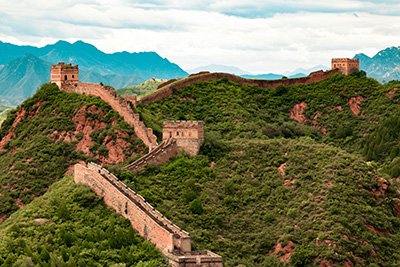
The Great Wall of China is undoubtedly the most iconic attraction in Beijing and one of the most famous landmarks in the world. This ancient wall spans over 13,000 miles and has stood for over 2,000 years, making it one of the greatest architectural feats in human history. The Great Wall is a must-see for anyone visiting Beijing, as it provides breathtaking views of the surrounding mountains and is a remarkable testament to China's rich history and culture.
Forbidden City
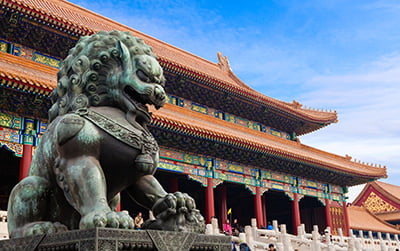
This imperial palace was once the home of China's emperors and their families, and it boasts over 9,000 rooms filled with ancient treasures and artifacts. Visitors can explore the many halls and pavilions of the Forbidden City, including the impressive Hall of Supreme Harmony, which is the largest and most important building in the palace.
Temple of Heaven
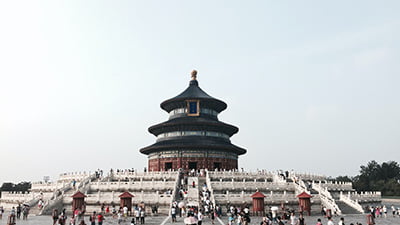
This famous landmark in Beijing is a magnificent example of ancient Chinese architecture. This UNESCO World Heritage Site was built in the 15th century and was used as a place of worship for emperors to pray for a good harvest. Today, visitors can stroll through the sprawling complex, admire the stunning architecture, and learn about the history and culture of China.
Tiananmen Square

Tiananmen Square is a Beijing city must-see attraction. As the largest public square in the world, it is an important symbol of China's political history and cultural heritage. Surrounded by historical landmarks such as the Forbidden City and the Great Hall of the People, Tiananmen Square is steeped in history. It offers visitors a glimpse into the heart of China.
Summer Palace
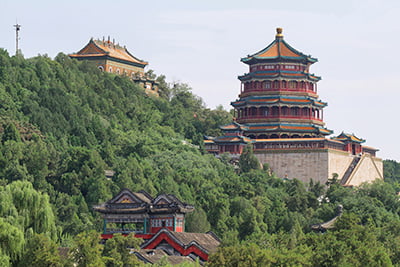
A beautiful park and UNESCO World Heritage Site that was once the summer residence of China's emperors. The park boasts stunning gardens, pavilions, and a tranquil lake, making it the perfect place for a peaceful retreat from the hustle and bustle of the city.
National Museum of China
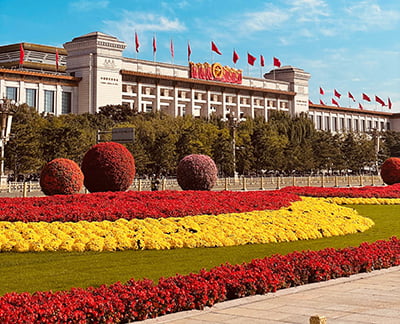
Located on the eastern side of Tiananmen Square, The National Museum of China is one of the world's largest museums, housing a vast collection of historical artifacts and artwork that spans over 5,000 years of Chinese history.
Beijing National Stadium (also known as the "Bird's Nest")
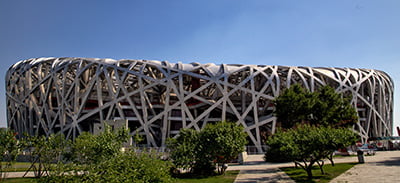
If you're a modern architecture or sports fan, The Beijing National Stadium, also known as the "Bird's Nest," is a must-see attraction during your visit to Beijing. Built for the 2008 Summer Olympics, this stunning architectural marvel symbolizes China's progress and innovation.
The Beijing Capital Museum
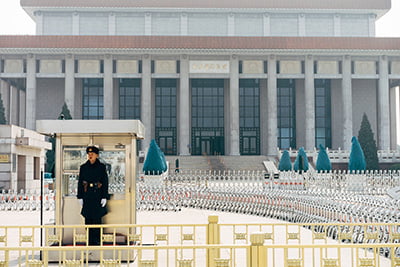
The Beijing Capital Museum is a modern museum that should be on your list of must-see attractions during your visit to Beijing. With over 200,000 artifacts showcasing the history and culture of Beijing and China, it offers visitors an insightful and engaging look into the city's past and present.
The 798 Art District
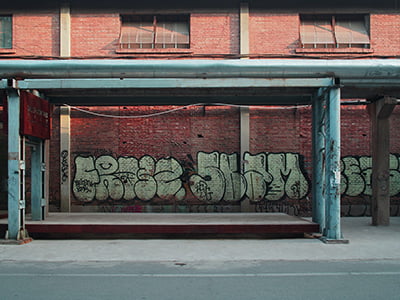
Discover Beijing's contemporary art scene in the 798 Art District, a former industrial area turned into a vibrant hub of creativity. Immerse yourself in the avant-garde galleries, street art, and trendy cafes. Marvel at the fascinating mix of traditional Chinese architecture and modern installations
Beihai Park
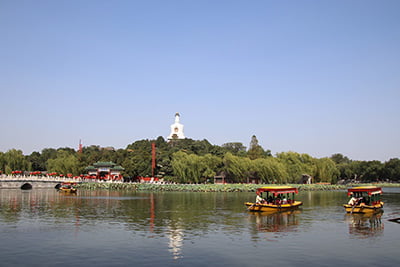
Stroll through ancient temples, stunning pavilions, and tranquil gardens in Beihai park. Watch locals practicing Tai Chi and playing traditional instruments. Boating on the lake is a must. A peaceful oasis in the heart of the city, Beihai Park is not to be missed.
Lama Temple
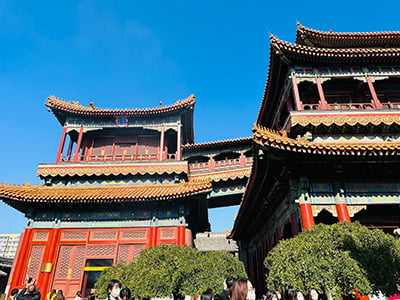
Explore the spiritual heart of Beijing at the Lama Temple, one of the city's most revered religious sites. Admire stunning architecture, intricate carvings, and ancient artifacts. Witness Buddhist monks chanting and lighting incense in the stunning halls. A fascinating glimpse into China's rich cultural and spiritual heritage.
Universal Studios Beijing
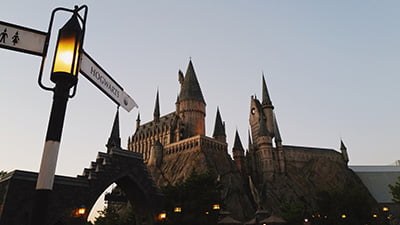
Universal Studios Beijing is an exciting world-class theme park that offers an unforgettable experience for visitors of all ages. With a range of thrilling rides, shows, and attractions, based on popular movies and TV shows, you'll be transported to different worlds and immersed in incredible adventures. Explore the magic of Universal Studios in Beijing.
Things To Do
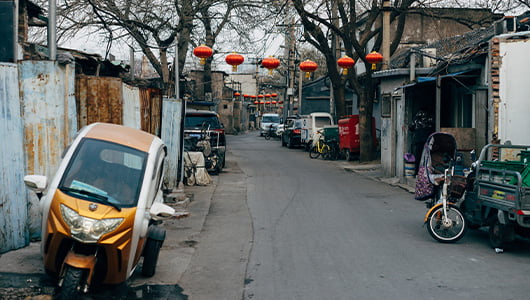
Go For A Stroll In Hutongs
Discover the authentic and charming old-world atmosphere of Beijing's hutongs. Narrow alleyways, traditional courtyard houses, and street markets give you a glimpse into the city's rich history and culture. Explore hidden gems, quaint cafes, and local shops. Take a rickshaw ride, visit a family home, and learn about the daily life of Beijing's residents. A unique and unforgettable experience.
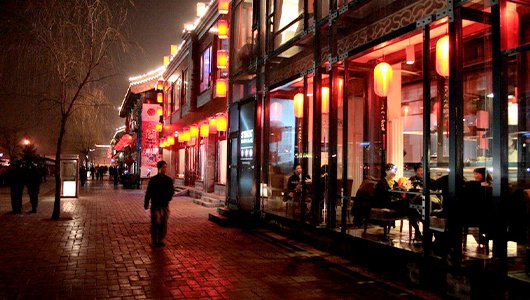
Experience Houhai
Experience the charm and liveliness of old Beijing at Houhai. Wander through the narrow alleys and traditional courtyard houses, browse unique shops and boutiques, and savor delicious street food. Take a boat ride on the serene lake or enjoy a drink at one of the many lively bars.
Houhai is a completely different world at night. The vibrant nightlife is not to be missed. The shimmering lake and the beautifully lit-up traditional architecture make for a breathtaking sight. Enjoy live music, street performers, and delicious food at one of the streets' many bars and restaurants.
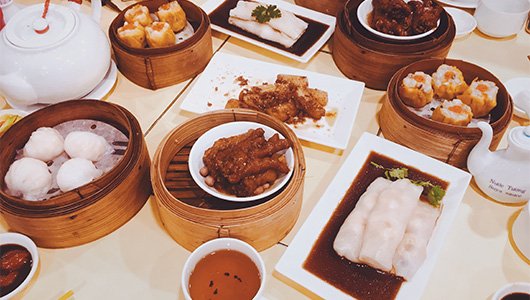
Try Local Cuisine
Beijing's cuisine reflects its rich history and diverse cultural influences. Savor the city's most famous dish, Peking Duck, with its crispy skin and tender meat. Other must-try dishes include dumplings, noodles, and hotpot. Sample street food, like jianbing and roujiamo, and experience the diverse flavors and aromas of the city's bustling markets.
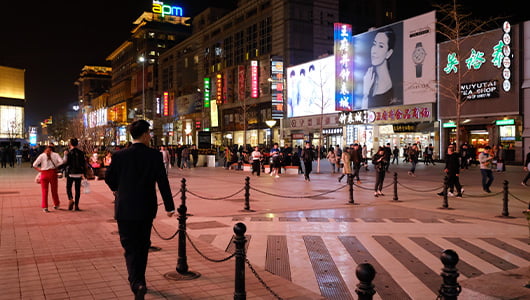
Shop And Eat At Wang Fu Jing
Wangfujing is Beijing's bustling commercial district, famous for its wide range of shops, boutiques, and restaurants. This lively pedestrian street is a shopper's paradise, with everything from luxury brands to traditional crafts. Taste unique snacks at the famous food street, catch a street performance or visit a night market.

Experience Karaoke
Karaoke is a popular activity in Beijing, with a range of venues to choose from, from luxurious private rooms to lively bars. Enjoy singing your favorite songs with friends or colleagues, and sample delicious food and drinks. Many karaoke venues offer multi-language song selections and English-language support, so everyone can join in the fun.
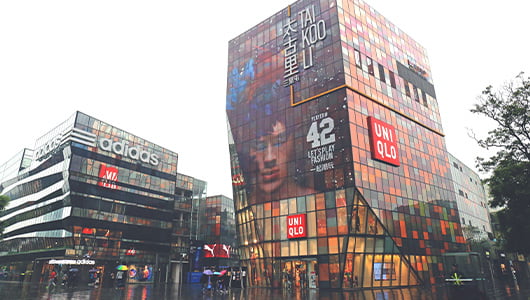
Visit San Li Tun
Sanlitun is Beijing's trendy and cosmopolitan neighborhood, filled with fashionable boutiques, bars, and restaurants. Explore the unique street art, catch a movie, or enjoy a drink at one of the many lively bars. Shop for designer brands or hunt for unique vintage finds.
Sanlitun transforms into a lively and vibrant scene at night, with countless bars and clubs offering a range of entertainment options. From live music and dance performances to comedy shows and DJ sets, there's something for everyone. Sample delicious food from around the world and experience the electrifying atmosphere that makes Sanlitun one of the hottest destinations in Beijing.
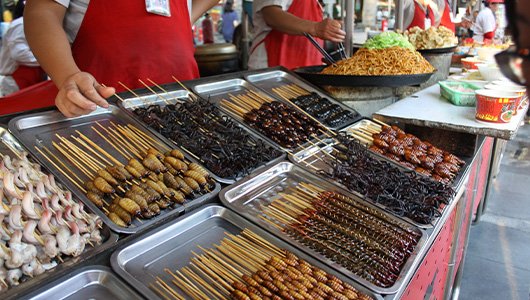
Go On A Culinary Adventure at Wang Fu Jing Food Street
Wang Fu Jing Food Street is a culinary adventure in the heart of Beijing. Sample a wide variety of traditional Chinese street food, from scorpion skewers to candied fruits and more. Savor local favorites like jianbing and roujiamo, or try something new and exotic. A true feast for the senses, not to be missed.
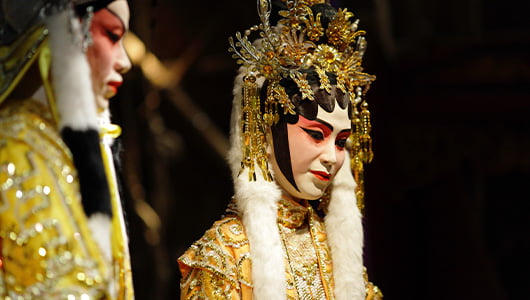
Watch A Chinese Opera at National Centre for the Performing Arts
Chinese opera is an ancient art form that dates back over 2,000 years. Beijing Opera, with its unique singing, acting, and acrobatic techniques, is one of China's most famous cultural treasures. Experience the intricate costumes, makeup, and stage design, and be transported back in time. A must-see attraction for any visitor to Beijing.
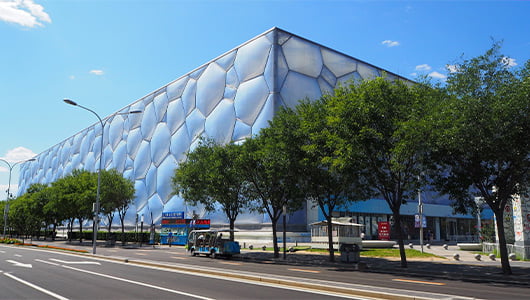
Go For A Swim At The Water Cube
The Water Cube, also known as the National Aquatics Center, was the site of the 2008 Olympic swimming events in Beijing. Today, visitors can swim in the same pool as the world's top athletes and enjoy a range of other aquatic activities. The Water Cube offers a unique and exciting experience for visitors to Beijing.
Where To Stay
Beijing offers a range of accommodation options to suit all budgets and preferences, from luxury hotels with breathtaking views of the city to boutique hotels with a unique charm to affordable hostels and guesthouses. Popular areas to stay in include the bustling city center, the charming hutongs, and the modern business district. Here are a few suggestions on the best areas to stay in Beijing based on what you're looking for:
Chongwenmen: A gate to the inner walled city in c. 1906 and is now a bustling neighborhood located in the Dongcheng District of Beijing. This is a great location to stay as it is convenient to public transportation, close to attractions, and is a shopper's paradise. Here you will find plenty of accommodation options, ranging from budget-friendly hostels to luxury hotels.
Wangfujing: If you're interested in shopping, food, and a lively atmosphere, Wangfujing is the perfect area for you. Located in the heart of Beijing, this neighborhood has an array of stores, restaurants, and street vendors to choose from. It's also within walking distance of many of the city's top attractions, including the Forbidden City and Tiananmen Square.
Chaoyang: Chaoyang is a modern neighborhood with plenty of high-end restaurants, bars, and shopping centers. It's also home to the Central Business District and several embassies. If you're looking for a more luxurious experience, Chaoyang is the perfect area to stay in.
Hutongs: For a more traditional experience, consider staying in one of Beijing's historic hutongs. These narrow alleyways are lined with traditional courtyard houses and offer a glimpse into Beijing's past. Many of the hutongs have been transformed into boutique hotels or guesthouses, making them unique and authentic places to stay.
Sanlitun: Sanlitun is a trendy area with plenty of hip bars, clubs, and restaurants. It's also home to the 798 Art District, which is a hub for contemporary art in Beijing. If you're looking for a lively and modern area to stay in, Sanlitun is a perfect choice.
Haidian: Haidian is located in the northwest part of Beijing and is home to several universities and research institutions. It's a great area to stay in if you're interested in visiting the Summer Palace or Fragrant Hills Park. It's also a quieter area compared to other parts of the city, which makes it a great option for families or those looking for a more relaxed experience.
Where Is Beijing Located
Beijing is the capital city of China, located in the northern part of the country. It is situated in the northeastern part of the North China Plain, at an elevation of about 43 meters above sea level. Beijing is surrounded by mountains to the west, north, and northeast and is about 120 kilometers from the Bohai Sea to the east.
How To Get To Beijing
Beijing is easily accessible by air, train, and bus. The city has two major airports, Beijing Capital International Airport, and Beijing Daxing International Airport, with connections to cities worldwide. High-speed trains connect Beijing with other major cities in China, like Shanghai, and several long-distance bus stations serve nearby provinces. Visitors can also arrive by car or bike or take a river cruise along the nearby canals.
Transportation Within
Beijing has an extensive public transportation system, including the subway, buses, and taxis, making it easy to navigate the city. The subway is fast and convenient, with 22 lines connecting major attractions and neighborhoods. Buses offer a budget-friendly option, with routes throughout the city. Taxis are also readily available but can be subject to traffic congestion. For a unique experience, visitors can rent a bike or take a rickshaw tour through the traditional hutongs.
With the subway system and bus, you can visit most of the major tourist attractions without needing a car or using a taxi. Depending on traffic, the subway is the most reliable and can be the fastest option.
Uber, Lyft, and Bolt are not currently available in Beijing. However, there are similar ride-hailing services available in the city, such as Didi Chuxing, which offers similar services and is widely used by locals and visitors alike. Other ride-hailing apps, such as Meituan and Shouqi, are also available and offer a range of transportation options.
Golden Tips
Download WeChat App On Your Phone
WeChat is an all-in-one messaging, social media, and payment app widely used by locals and foreigners in China. WeChat is an essential app that you will want to download on your smartphone as it is widely used in China for everything from shopping to buying dinner. To use WeChat Pay, you'll need to link your bank account or credit card to your WeChat account. You can then use WeChat Pay to scan QR codes at stores, restaurants, and other businesses that accept WeChat payments.
While most places do take cash, WeChat is much more widely used, and some places only accept WeChat payments.
Plan ahead
Beijing is a huge city with many attractions, so plan your itinerary in advance to make the most of your time.
Get a guidebook
A guidebook can be helpful for finding your way around and providing background information on the city's history and culture.
Learn some basic Chinese
Most signs in Beijing have English translations, and many younger generations speak some English, but knowing some basic Chinese phrases can be helpful for getting around and communicating with locals. The Chinese language spoken in Beijing is Mandarin, the administrative language of the Ming and Qing dynasties.
Bring a face mask
Air pollution can be a problem in Beijing, so bring a face mask to protect yourself when air quality is poor.
Be prepared for crowds
Beijing is a popular tourist destination, so be prepared for crowds at major attractions and popular areas.
Take care with street food
Beijing's street food can be delicious, but take care to choose vendors with clean and hygienic practices.
Bring comfortable shoes
You'll be doing a lot of walking in Beijing, so bring comfortable shoes for exploring the city.
Stay safe
Beijing is a relatively safe city, but be aware of your surroundings, avoid carrying large amounts of cash, and be cautious when taking taxis or using public transportation at night.
Pack Some Tissue and Hand Sanitizer In Your Hand Bag
Always pack some tissue paper and hand sanitizer before heading to a public bathroom. Unfortunately, many bathrooms do not have toilet paper and hand soap available.
